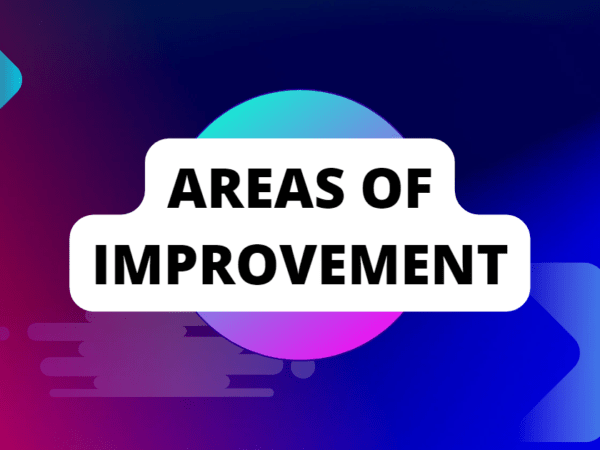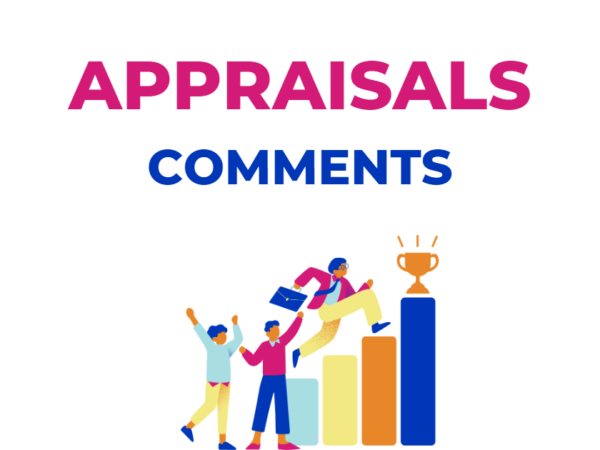Appraisal Comments for ‘Leadership’

Leadership
Leadership is an important skill in the workplace because it allows you to inspire and guide teams to success. To improve and grow as a leader, it is critical to be self-aware and constantly assess one’s own performance.
Self-appraisal comments are a valuable tool for this, allowing leaders to reflect on their leadership strengths and areas for improvement.
Also Read: Appraisal Comments for ‘Team Work’
In This article we will provide 48 self-appraisal comments for leadership, covering a wide range of skills and attributes that are required for effective workplace leadership. Leaders can gain insights into their own performance and identify areas where they can continue to develop and grow as leaders by using these comments as a reference.

Self Appraisal comments for Leadership
“I consistently demonstrate a strong vision and sense of purpose, inspiring my team to strive towards a shared goal.”
“I am skilled at building relationships and rapport with team members, creating a positive and supportive team culture.”
“I effectively communicate with team members, ensuring that everyone is aligned and working towards the same goals.”
“I am a good listener, and I seek out and value feedback from team members to continually improve my leadership skills.”
“I am approachable and accessible, encouraging team members to come to me with questions or concerns.”
“I empower team members to take ownership of their work, providing them with the autonomy and support they need to succeed.”
“I am responsive and adaptable to changes in the workplace, adjusting my leadership style as necessary to meet new challenges.”
“I foster an environment of innovation and creativity, encouraging team members to think outside the box and try new things.”
“I am committed to developing the skills and abilities of team members, providing opportunities for growth and development.”
“I am accountable for my actions and decisions, and I take responsibility for any mistakes or errors that occur.”
“I am open and transparent in my communication with team members, ensuring that everyone has access to the information they need to do their jobs.”
“I lead by example, demonstrating the behaviors and values that I expect from team members.”
“I am able to manage conflicts and challenges within the team, finding solutions that benefit everyone involved.”
“I am able to delegate tasks effectively, ensuring that each team member has the appropriate workload and responsibilities.”
“I am skilled at providing constructive feedback and coaching to team members, helping them to improve their skills and performance.”
“I am able to balance the needs of individual team members with the needs of the team as a whole.”
“I am able to make difficult decisions when necessary, taking into account the perspectives and opinions of all team members.”
“I am able to handle stress and pressure effectively, maintaining a positive and proactive attitude in challenging situations.”
“I am able to recognize and appreciate the contributions of team members, promoting a culture of recognition and appreciation.”
“I am able to effectively manage my time and resources, ensuring that I am able to meet my own goals and those of the team.”
“I am able to build trust and respect with team members, creating an environment where everyone feels valued and supported.”
“I am able to lead and motivate team members to achieve their best work, even in challenging or demanding situations.”
“I am able to identify areas where the team can improve, and I work proactively to address these issues.”
“I am able to recognize and address problems within the team, promoting a culture of accountability and ownership.”
“I am able to foster a culture of creativity and innovation within the team, encouraging team members to think outside the box and take risks.”
“I am able to build strong relationships with key stakeholders outside of the team, promoting collaboration and partnership.”
“I am able to identify and leverage the strengths of each team member, creating a team that is greater than the sum of its parts.”
“I am able to create a clear and compelling vision for the team, inspiring and motivating team members to work towards this vision.”
“I am able to effectively manage and resolve conflicts within the team, finding solutions that benefit everyone involved.”
“I am able to provide clear and specific feedback to team members, helping them to understand their strengths and areas for improvement.”
“I am able to set challenging but achievable goals for the team, creating a culture of continuous improvement”
“I need to work on being more assertive in decision-making to inspire confidence and trust in my team.”
“I have shown strong ability in leading my team during times of crisis and uncertainty.”
“I could improve my delegation skills to better utilize the strengths of each team member.”
“I am effective in providing guidance and mentorship to team members seeking professional development.”
“I have demonstrated a willingness to take calculated risks in pursuing innovative ideas for the benefit of the team and company.”
“I am confident in leading and facilitating group discussions to foster collaboration and brainstorming.”
“I could work on being more transparent with my decision-making processes to build trust and confidence with my team.”
“I am skilled at identifying and resolving conflicts within my team to maintain a positive and productive work environment.”
“I am always seeking feedback from my team to continuously improve my leadership skills.”
“I am able to set clear expectations for my team and hold team members accountable for their responsibilities.”
“I have developed effective strategies for managing and prioritizing multiple projects simultaneously.”
“I have shown the ability to lead by example and inspire my team through my own work ethic and dedication.”
These appraisal comments demonstrate a wide range of leadership abilities and characteristics, including communication, delegation, mentorship, risk-taking, transparency, conflict resolution, accountability, and work ethic.
Leaders must evaluate their own performance on a regular basis and identify areas for improvement in order to continuously develop their skills and effectively lead their teams to success. Leaders can create a roadmap for personal and professional growth by reflecting on their own strengths and weaknesses, resulting in increased job satisfaction and a more productive and engaged team.







